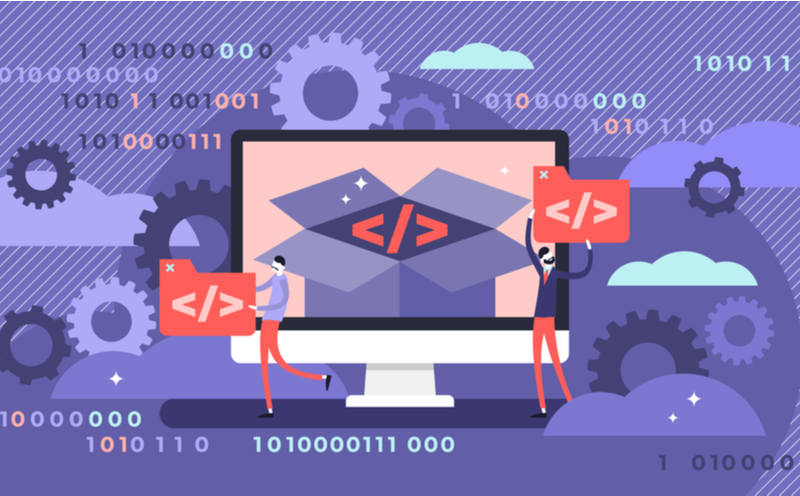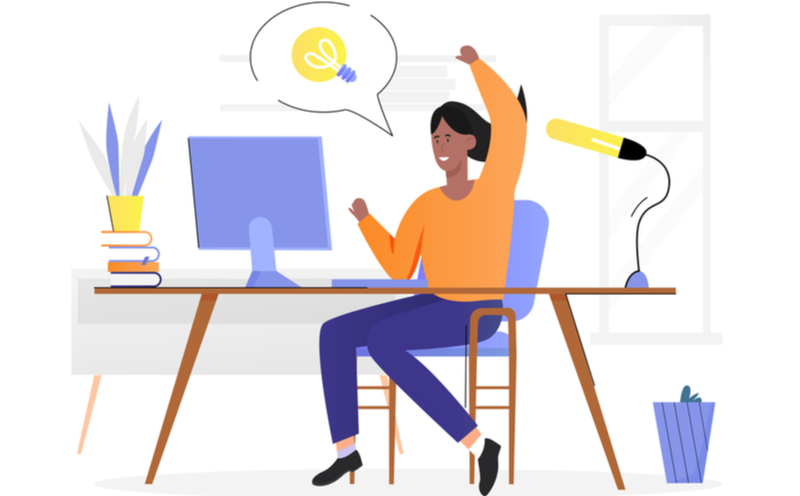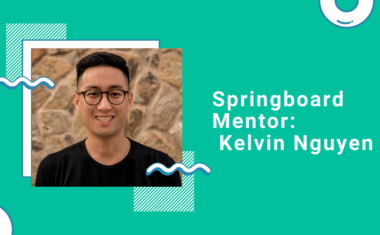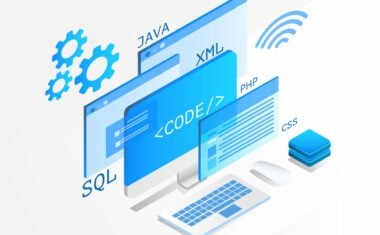How To Become a Coder from Scratch [10 Step Career Guide]
![How To Become a Coder from Scratch [10 Step Career Guide]](https://www.springboard.com/blog/wp-content/uploads/2022/03/how-to-become-a-coder-from-scratch-10-step-career-guide.png)
In this article
Coding is an attractive career choice for several reasons. First off, coders are in high demand—the result of an ongoing shortage of talent in the industry. So if you’re a coder with strong fundamentals and some experience, it’s easy to land a job. And coding is an exciting career choice, as being a coder puts you at the center of the ongoing digital revolution.
If you want to become a coder, there’s no shortage of learning materials. But with the wealth of resources available, it can be difficult to know where to start. If that’s where you find yourself, then keep reading. We’re going to tell you what it means to be a coder, how you can learn programming from scratch, and the different kinds of roles that coders have in software companies.
What Is Coding?
Coding is the process of telling a computer what to do and how you want it done. With code, you can build native applications, websites, or anything you envision.
The coding process usually starts with a problem statement. Maybe you want to analyze your favorite basketball players’ stats in a season or build a website where you can post the art that you make. Those are just a couple of examples of problems that you can solve using code. See here why coding is hard to learn for some people.
Having chosen your problem statement, you can then look for a solution. Coders usually start by writing an algorithm—the sequence of steps that the computer needs to follow to solve a problem. Once you’ve written an algorithm, you can translate this into computer code using your preferred programming language.
What Does a Coder Do?

Coders do more than just write code. They also have to chalk out software architectures, test systems, and debug code. Here are some of the things that coders do on a daily basis.
- Conceptualize software architectures to build systems that solve a particular problem
- Produce specifications for a software project
- Write algorithms and pseudocode to depict the logical flow of a program
- Write code and implement software systems
- Test software systems
- Perform code reviews and debug code
- Analyze the performance of software programs and recommend optimizations
- Build databases that make it easy to store and retrieve data
- Study systems from a security perspective and implement measures like firewalls and authorization levels
9 Steps To Become a Coder
-
Reflect on Your Interests
-
Meet the Educational Requirements
-
Figure Out the Mode of Learning
-
Acquire Coding Skills
-
Choose a Specialty
-
Work on Projects
-
Create a Portfolio
-
Find a Mentor
-
Network
Ready to become a coder? Follow these ten steps to launch your career.
Reflect on Your Interests
Though coding has become something of a recent fad, it’s important to reflect on your own personal reasons for wanting to become a coder. Think about why you’re interested in programming and what aspects of it you feel most passionately about. This will save you time and energy down the road. A lot of coders stumble into the discipline and then look for courses and jobs at random. But if you can articulate why you’re pursuing a career in software and what you like about it, you’ll find yourself making better, more decisive choices later on.
Meet the Educational Requirements
Nowadays, you don’t have to go to college to learn how to code. Most companies will hire individuals on the basis of the online courses they’ve completed or projects that they’ve built themselves.
There are, however, certain areas within the software industry where it helps to have more credentials. If you’re looking to work as a data scientist, for example, then it will help to have a degree in computer science or a mathematics field. There are certain jobs in networks and cyber security in which you need to be certified to land a job.
There isn’t a one-size-fits-all answer for job requirements in the software industry. Comb through job listings in your field and talk to recruiters to learn what prerequisites are needed.
Get To Know Other Software Engineering Students
Julia Ayres
Software Engineer at Northspyre
Abdelkareem ElSharief
Software Engineer at Bread
Kristy Chu
Software Engineer at FloQast
Figure Out the Mode of Learning
There are a few different ways to become a coder. Let’s look at the options and what each entails.
Degree
Earning a college degree is the most rigorous and intensive way to get a software education. It exposes you to a broad range of topics and gives you the ability to learn in person and amongst peers. But it can be costly and is time-intensive.
Bootcamps or Courses (Online/Offline)
Bootcamps are a great alternative to a college degree. Coding bootcamps offer many of the same benefits as a degree program, but at a much lower price. Many bootcamps offer a money-back guarantee after you successfully complete the bootcamp.
Self Learning
If you think of yourself as an autodidact, then you can take the coding journey all on your own. You can take advantage of books, Youtube channels, and free courses to pick up programming skills.
Self learning is the most economical option and you can proceed at your own pace. But if you decide to learn programming in this way, it can be difficult to know if you’re on the right learning path.
Acquire Coding Skills
Learn Programming Languages

Here’s a broad overview of the most popular programming languages. Pick the one that’s right for you.
HTML/CSS
HTML and CSS are the languages you need to know to build basic web pages. HTML defines the structure of a page and CSS lets you design its elements.
Java
Java is known as a “write once, run anywhere” programming language. This means that you can write code in Java that works across platforms and operating systems. You can use it to build everything from mobile games to server-side applications.
Javascript
Javascript has a well-deserved reputation as being a programming language for the web, as it can be used to build both front-end and back-end applications. But Javascript is also gaining popularity as a language that can be used to build IoT applications.
Python
Python is popular both because of its intuitive syntax and versatility. You can use Python to build powerful deep learning models, or something as simple as a website.
C++
C++ is used widely because of its multi-paradigm capabilities, which allow programmers to use the software development approach of their choice, whether that’s object-oriented or procedural programming.
R
If you’re interested in programming from a statistical standpoint, then R is the language to use. It is often used by statisticians and data scientists to build statistical models and data analysis algorithms.
Swift
Swift is the programming language of the Apple ecosystem. With it, you can build applications for macOS, watchOS, and all of the other Apple platforms. By learning Swift, you access all of the software infrastructure and libraries that the company makes available to its developers.
Learn Algorithm Skills
Algorithms are the building blocks of any program, and the best software developers can quickly translate a problem statement into a solution in the form of an algorithm.
To start writing your own algorithms, start by getting familiar with basic problem-solving approaches and some computational logic. It’s also important to know how the “Big O” notation works so that you can analyze the space and time complexity of algorithms.
Learn Intangible Programming Skills
There are a host of programming skills that aren’t in the form of code. This includes attention to detail, critical thinking, and logical reasoning.
You cannot learn these skills all at once. But you can learn them by applying these principles when you’re solving problems and writing code. Working on foundational math skills can also help with logic and problem-solving approaches.
Choose a Specialty

As a programmer, there are various career options available to you. This includes:
Software Application Developer
Software application developers design, build, and test software. This can include anything from system applications to apps.
Systems Analyst
Systems analysts study software systems. They examine information technology architecture and recommend ways in which it can be optimized.
Database Administrator
Database administrators determine the information storage requirements of an organization or a particular piece of software and build the requisite database for it.
Front-End Developer
Everything that you see on the internet was programmed by a front-end developer. They write the code that tells browsers what information should be shown and how it should be presented.
Back-End Developer
When you use a website, there are computations and interactions happening that you don’t see. This is called the back end of the website. Back-end developers write code to define communications between back-end applications and databases.
Work on Projects
The only way to know if you’re progressing is to test your skills by building your own projects. You can choose to either work on something independently, or you can contribute to open source projects. Both will teach you practical experience so that you’ll know what it’s like to deploy software in a real-world setting.
Create a Portfolio
Once you have projects under your belt, it’s time to create a portfolio. These are documents or websites that list your projects with details on the programming languages, frameworks, and problem-solving approaches that you use to build a piece of software.
You can tailor your portfolio to different jobs that you’re applying for. So if you’re applying to a front-end development role, you would only include the websites and UX projects that you’ve worked on.
Find a Mentor

How do you know if the code you’re writing is readable and matches industry standards? Are you learning the right skills for the career goals that you have? If you want the answers to questions like those, it helps to have a mentor.
You can find a mentor within your personal network, at your college, or at work if your colleagues are experienced developers. When you approach someone to be your mentor, make sure that you have a specific ask and that their experience matches your requirements.
Plan ahead of each meeting to get the most out of your mentorship. Set an agenda and write down specific questions or things that you need help with. Mentors appreciate it when there is clarity on what is expected of them.
Network
When you’re ready to start looking for a programming job, having a network can help you land your dream role.
Start the networking process by leveraging your existing contacts. Catch up with friends who work in the software industry, or with professors who taught your programming classes in college. Let them know that you’re looking for a job and which specific areas you could use help with.
Once you’ve tapped into your existing network, you can slowly begin to branch out. You can use sites like LinkedIn to connect with recruiters and software engineers. Conferences and local events are also great places to meet people in the industry.
Related Read: How To Land a Programming Job With No Experience
How Much Can You Make as a Coder?
The average entry-level salary for a coder is around $50,000. But it is possible to make more once you have a specialization, which we will examine in the following section.
Potential Career Paths for Coders
Full-Stack Developer
What They Do
Full-stack developers can build both the front end and back end of a website. So they have to be proficient in HTML, CSS, and Javascript, as well as server-side scripting and databases (check out our guide to full stack developer skills here).
Who It’s For
Full-stack development is a great job for programmers who enjoy building websites end to end. It gives you the ability to craft both the user-facing and computational elements of websites.
Salary
The average salary of a full-stack developer in the United States is $103,000.
Software Engineer
What They Do

Software engineers design and build software applications. These could be for desktops, mobile apps, or cloud platforms.
Who It’s For
Software engineering is well-suited for individuals with a strong foundation in theoretical computer science and basic mathematical analysis.
Salary
Software engineers in the United States make $117,000 per year on average annually.
Game Developer
What They Do
Game developers design and code games for different platforms. Their work can involve character design, video game mechanics, UI, and level design.
Who It’s For
Many programmers enter game development because they’re passionate about gaming. The field requires familiarity with computer science fundamentals, knowledge of development engines, and the ability to code in C++ and C#.
Salary
Game developers in the United States make $102,000 per year on average.
System Analyst
What They Do

System analysts maintain software systems and improve their performance.
Who It’s For
This job is a good match for programmers with a broad understanding of software systems and how they interact with hardware. The role requires excellent analytical skills and an understanding of problem-solving methodologies.
Salary
The average salary of a system analyst is $79,000.
Database Programmer
What They Do
Database programmers develop and maintain database systems. They work with software engineers to determine the data requirements for each project and build databases accordingly.
Who It’s For
You should consider working as a database programmer if you’re interested in database technologies and building data storage systems from the ground up.
Salary
The average annual salary for database programmers in the US in 2022 is $79,000.
FAQs About Coding
Can You Learn Coding on Your Own?
Yes, you can learn to code on your own. There are various free and paid resources that can teach you different programming languages. If you’re completely new to the field, it does help to work through a course or bootcamp, where you can get help from instructors and your peers.
Does Coding Require Knowledge of Math?
Yes, most coding jobs require a knowledge of basic math. You need to have a fundamental grasp of algebra, discrete mathematics, and statistics, and be proficient as a programmer.
Which Coding Language Is the Best?
Programming languages are tools. And just like physical tools, there isn’t the best programming language. Each one is suited for solving different kinds of problems, so each has its own advantages and disadvantages. Choose the programming language that best fits the problem you’re working on.
What Is the Difference Between Coding and Programming?
Coding is the process of writing software code. Programming is broader and involves writing algorithms, selecting data structures, and planning the overall structure of the system being built.
Since you’re here…
Interested in a career in software engineering? Join our mentor-led Software Engineering Bootcamp or our foundational Software Engineering Course if you’re just starting out. We help people make the switch every day (just peep our reviews). You can do it, too!





